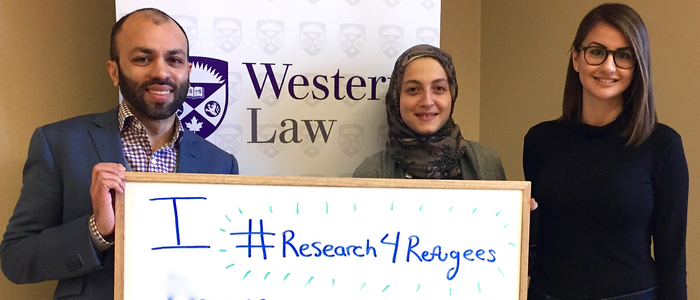Law student “research-a-thon” assists refugees
February 08, 2017

Professor Asad Kiyani and Second-year Western Law students Nusaiba Al-Azem and Yasmin Sattarzadeh
It was no ordinary Saturday for more than 90 Western Law students.
Motivated to lend their time and talent in light of the recent travel bans imposed by U.S. President Donald Trump’s ban on seven majority-Muslim countries, the students took part in a research marathon to assist the Canadian Council for Refugees (CCR) on Feb. 4.
It was part of a collective effort of law students from across the country to create research materials for the CCR in order for it to launch a challenge to the Safe Third Country Agreement.
The Agreement, which came into effect in 2004, prevents refugees from seeking asylum in both Canada and the U.S. Those seeking protection must make a claim in the first country they arrive in. Because of this, refugees thrown into limbo as a result of the U.S. travel ban cannot be offered asylum in Canada.
Second-year Western Law student Yasmin Sattarzadeh coordinated the research initiative at the law school along with fellow student Nusaiba Al-Azem and Professor Asad Kiyani.
Sattarzadeh said she felt a personal connection to the cause because her Mother was a political refugee from Iran.
“The events across the border under President Donald Trump have been jarring, unsettling and unjust,” she said. "Those who participated in the event signaled they don’t want to stand idly by and watch this form of injustice occur. We were happy we could use the tools we learned in class to participate in this cause."
The students’ research aimed to create a clear articulation of the reasons why the United States is not a “safe nation” for the purpose of making a refugee claim.
With assistance from Professor Sam Trosow and PhD student Lisa Macklem, the students produced a high-quality 158-page research on non-refoulement, the practice of not forcing refugees or asylum seekers to return to a country in which they are liable to be subjected to persecution.
“I was deeply impressed with the number of students who had turned out to work on this project,” said Prof. Kiyani. “They were there to support each other, and to help some of the most vulnerable people in the world. That selflessness and social conscience is a great credit to our students.”
The project began as a local initiative by the McGill Faculty of Law and quickly grew to include all 22 law schools in Canada. This event marked the first time Canadian law students have coordinated an effort of this magnitude, and Western Law had more students involved than any other law school in the country.
The initiative also raised money for CCR, a national non-profit umbrella organization committed to the rights and protection of refugees in Canada and around the world.
“Participating in the research-a-thon has been the highlight of my time at Western Law,” Sattarzadeh said. “Every individual rightly deserves an advocate, and refugee rights are human rights.”






